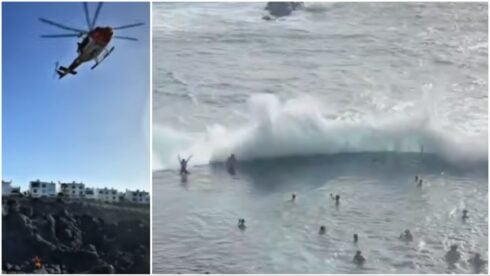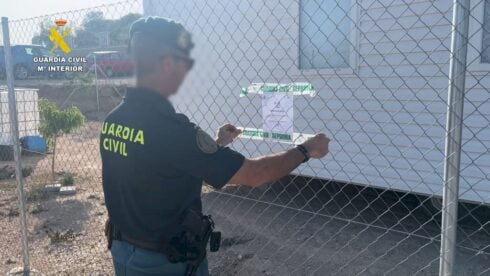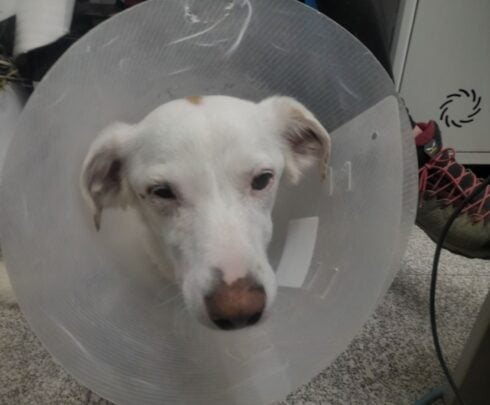By Jon Clarke, Josie Sharp and Rachel Gore
THE warning came out from the government and police in Madrid in early August, but it didn’t make giant waves in the media.
It came after four confirmed cases of spiking had taken place at Pamplona’s famous San Fermin festival the previous month and a serious one at a nightclub in Malaga in June.
Later that month Spain’s Equality Ministry began a series of initiatives to gather evidence and protect revellers at festivals and ferias around the country.

The so-called ‘violet points’ were set up to help victims and witnesses of sexual harassment.
Named after the colour connected to the feminist movement, they were rolled out
at Valencia’s Medusa Sunbeach Festival.
The country’s biggest electronic music festival, in Cullera, set up tents where partygoers could test their drinks for psychoactive drugs.
The simple drug tests can quickly discover if something has been slipped into anyone’s drink.
Samples are inserted into a test tube with a chemical re-agent and if the drink, for example, has the date rape drug GHB, it turns bright red.
Sometimes called ‘purple points’ or ‘punta lilas’, as soon as there is a positive test the police are immediately called.
As the Olive Press reported when we launched our Smash the Spiking campaign a decade ago, the term ‘chemical submission’ was only just becoming a threat for women going out.
We soon realised that the so-called ‘spiking’ of drinks was happening more and more frequently.
And it was also happening to some men too, often to rob them as they left a club or bar, as it happened to a BBC sports reporter Alan Tait in Puerto Banus in 2014.
Alarmingly he fell into a coma after being given ketamine and the 45-year-old woke up in a backstreet with cuts and bruises to his head and face. His shirt had been removed and his trousers torn.
Some two years later in 2016 security boss James Hickey, 36, told the Olive Press was shocked at the increasingly brazen approach of criminals: “It’s very worrying as it seems that anyone is a target,” said the former Royal Green Jacket soldier.
“A police contact has warned me that crime related to spiking is very prevalent along the coast,” continued Hickey, who moved to Estepona after working in the Middle East for eight years.

“People need to make sure they are looking out for each other.”
The issue emerged again in 2022, when police confirmed there was an even more alarming threat to revellers who were being directly injected with a drug.
They reported the incidence of this type of crime, which is normally sexually motivated, increased from 14% to 35% in 2021 alone, with over 1,000 incidents reported.
And the problem appeared to increase, with many women reporting a small prick as they were out with friends.
However, out of the 300 so-called ‘pinchazo’ cases investigated across Spain, the tests extraordinarily revealed that no victims had been injected with any chemical substances.
Despite no chemicals being detected, concerns have been raised about the cleanliness of the needles used, as they could potentially carry serious infections like HIV/AIDS.
Malaga
In Malaga, this summer, a tourist went to have a toxicology test after she was spiked and sexually assaulted in a city centre nightclub on June 28.
The woman reported being inappropriately touched to police, which triggered emergency protocols.
On her way to hospital, she told paramedics she believed she had been injected with a substance to make her drowsy by the man.
Medical staff examined her and found a puncture mark on her right shoulder that could have been from a needle.
The Policia Nacional’s Family and Women’s Unit is still waiting for results from blood and urine tests taken at the hospital to discover if drugs were involved.
Data from Andalucia’s health ministry recorded 10 cases of spiking were reported in Malaga, with a total of 96 cases recorded across the region last year.
The majority of victims were women, with only nine cases reported by men.
‘Costas are a hotspot but I can’t get anyone to come forward’
Spiking, the act of adding drugs or alcohol to someone’s food or drink without consent, can also be done by injecting substances into victims with needles.
The phenomenon of ‘needle spiking’ grew in popularity in the UK before spreading to Spain.
A wave of needle spiking claims have been reported to police in Europe since, including 175 in France this year.

ESTATE agent Lisa Burgess, 38, who runs Costa del Sol Chatter Facebook says her hometown Fuengirola is a hotspot for drugging and sexual assaults, but that they ‘almost all go unreported’.
She recalled seeing a tourist unconscious on a beach this summer and a man attempting to rob her and take off her clothes. She believes she was spiked with drugs.
Lisa said: “It’s all unreported, I can’t get anybody to come forward.
“None of the bar owners will come forward, because then they fear their bar is going to be targeted, and now it’s happening to more men.
“In my opinion, it seems to be 30% men, and 70% women are now victims to drugging and attempted assaults on the Costa del Sol.”
Although most alleged victims said they felt drowsy, and suffered memory loss, and loss of coordination, police investigations have found no evidence to support these claims, as test results consistently proved negative.
No reports of needle spiking in the UK or Spain have been confirmed by medical reports or police investigations.
Even without confirmed drugging cases, the phenomenon prompted many nightclubs across Europe to introduce more safety measures to protect potential victims.
Lisa said: “I think bars should consider safety as a promotion, advertising themselves as a spike-free bar.”
She continued: “Groups could come together to make spike-free zones. Make safety part of their image, it could save lives.”
READ MORE:
- OPINION: Let’s smash the drink spiking menace in Spain!
- EYES OUT FOR ALL: The Olive Press is relaunching its ‘Smash the Spiking’ campaign with Sala Group Holdings to tackle the growing menace of drink spiking in Spain
Erasmus student speaks out over terrifying suspected spiking in Madrid night club
Meanwhile, Detective Maria Luisa Calcerrada, a senior investigator for the Guardia Civil in Madrid, told the Olive Press that ‘none of the 96 confirmed cases in Andalucia last year involved drugs.’ She added: “We haven’t had any cases of drug-facilitated sexual assault. All test results have been negative. But this is still a very serious offence. It is not a game. People are being harmed. Perpetrators are not organised. They come from different backgrounds and have different motivations. But it always happens in crowded venues like clubs or festivals,” she said.
Forensic forensic toxicology professor Angelines Cruz, from Santiago de Compostela University, warned of deadly risks even when no drugs are used.“If the same needles are reused across victims, we’re looking at a real danger of spreading serious diseases like hepatitis or HIV,” she told our investigation.
And Daniel Espasses, 33, President of the Association of Nightclubs, told the Olive Press a nationwide protocol is now in place. “If someone is pricked or shows symptoms, we call the police immediately. An ambulance is dispatched, tests are carried out at the scene and again at the hospital,” he said. “We also have cameras everywhere and trained staff.”
What can be done?
SCIENTISTS have developed cups, straws, and even nail polish that react when they come into contact with a drink laced with drugs.
One preventative tool that has been developed to protect victims is the Sentinel Bracelet created by the Spanish creative agency, Aglaya Creativos, costing only €8.
The bracelet contains a protective film that reacts to the presence of drugs five seconds after a few drops of the suspected liquid are applied to its surface.
Users can then scan the QR code on the bracelet to check whether the results are positive or negative, access emergency information, and find educational resources on how to prevent drink spiking.
Another is Drinks Guard created by Spanish company, Guardians of Beauty.
Their test papers use CYD technology to detect traces of drugs when one drops liquid onto them. They change to orange or blue from yellow or pink if they find GHB, ketamine, scopolamine or amine drugs.
A pack of five reactive papers retails at €15.
At Madrid’s 2025 San Miguel festival, they handed out 5,000 free wristbands that detect the presence of drugs in drinks.
This pilot project was rolled out to prevent individuals consuming spiked drinks.
In 2022, the Spanish government launched Puntas Violetas in several provinces to combat gender-based violence including sexual assaults, with Malaga opening its 32nd location in the network on June 17.
Regardless of the evidence of substances, the Junta has warned perpetrators that pricking someone with a needle is still a crime, as it can cause harm and requires medical assistance.
The symptoms
EXCESSIVE drowsiness, headaches and nausea are likely signs of spiking. So are clumsy movements, vomiting, blurred vision or seeing or hearing things.
Another sure sign is a loss of memory, disorientation and dishevelled clothing.
In addition, watch out for the presence of unknown people, as well as witnesses saying the victim was ‘behaving strangely’ or ‘hadn’t drunk enough’ to behave in that way.
If anybody thinks they have been spiked, either directly or with something put in their drink, you need to immediately tell friends you are out with.
They or you must immediately ask for help from staff and alert the police.
Then you need to go to a hospital to be tested for toxic substances in the bloodstream.
Have you been a victim of spiking? Have you got your own story? Contact us at newsdesk@theolivepress.es
Click here to read more Spain News from The Olive Press.








